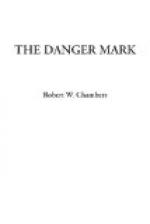The unholy ease with which he had done it gave him a secret thrill of admiration. It was apparently all surface—the exquisite masquerader, the surrounding detail, the technical graciousness and flow of line and contour, the effortless brush-work. Yet, with an ease which demanded very respectful consideration, he had absorbed and transmitted the frivolous spirit of the old French masters, which they themselves took so seriously; the portrait was also a likeness, yet delightfully permeated with the charm of a light-minded epoch; and somehow, behind and underneath it all, a brilliant mockery sparkled—the half-amused, half-indifferent brilliancy of the painter himself. It was there for any who could appreciate it, and it was quite irresistible, particularly since he had, after a dazzling preliminary study or two from a gamekeeper’s small, chubby son, added, fluttering in mid-air, a pair of white-winged Loves, chubby as cherubs but much more Gallic.
Nobody excepting Rosalie and himself had seen the picture. What he meant to do with it he did not know, half ashamed as he was of its satiric cleverness. Painters would hate it—stand hypnotised, spellbound the while—and hate it, for they are a serious sort, your painters of pictures, and they couldn’t appreciate an art which made fun of art; they would execrate the uncanny mastery and utterly miss the gay perversity of the performance, and Duane knew it and laughed wickedly. What a shock! What would sober, seriously inclined people think if an actor who was eminently fitted to play Lear, should bow to his audience and earnestly perform a very complicated and perfect flip-flap?
Amused with his own disrespectful reflections, he stood before the picture, turning from it with a grin from time to time to compare it with some dozen vigorous canvases hanging along the studio wall—studies that he knew would instantly command the owlish respect of the truly earnest—connoisseurs, critics, and academicians in this very earnest land of ours.
There was a Sargent-like portrait of old Miller, with something of that great master’s raucous colouring and perhaps intentional discords, and all of his technical effrontery; and here, too, lurked that shadow of mockery ever latent in the young man’s brush—something far more subtle than caricature or parody—deeper than the imitation of manner—something like the evanescent caprice of a strong hand, which seems to threaten for a second, then passes on lightly, surely, transforming its menace into a caress.
There were two adorable nude studies of Miller’s granddaughters, aged six and seven—quaintly and engagingly formal in their naive astonishment at finding themselves quite naked. There was a fine sketch of Howker, wrinkled, dim-eyed, every inch a butler, every fibre in him the dignified and self-respecting, old-time servant, who added his dignity to that of the house he had served so long and well. The latter picture was masterly, recalling Gandara’s earlier simplicity and Whistler’s single-minded concentration without that gentleman’s rickety drawing and harmonious arrangements in mud.




